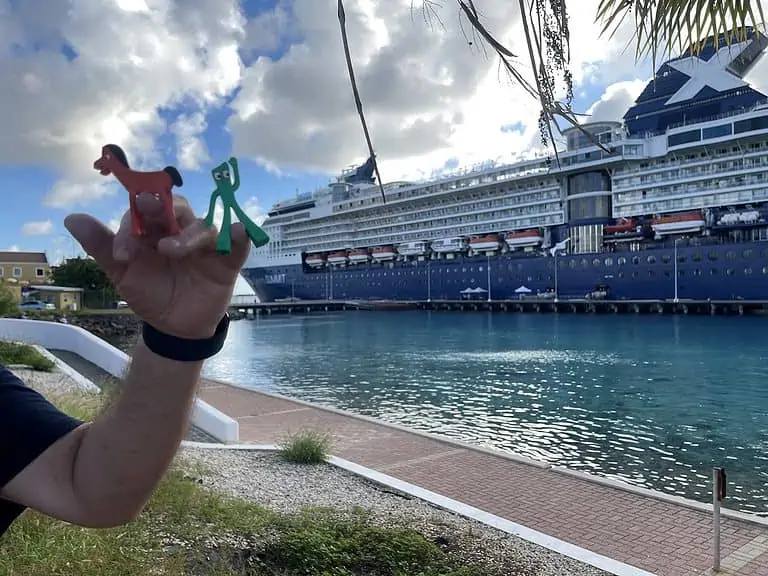11 Easy Tips To Stay Healthy When Traveling
We all know that traveling is a great experience and there are plenty of benefits to hitting the road. But when you travel, it seems you are always on and off planes, in and out of air-conditioning, and changing climates constantly.
It’s essential to stay healthy while traveling to make the experience more enjoyable and prevent any significant illnesses from popping up unexpectedly. Under the constantly changing conditions on the road, it can be challenging to take care of yourself properly.
That’s why I try to follow these 11 easy tips to stay healthy when traveling. When you see how easy it is to keep fit, I know you’ll be on board too.
This article may contain affiliate links. We may earn a commission if you use these links to buy products or services. Please see our disclosure policy for full details. Thanks.
1. Prime Your Immune System To Fight Off Germs
Before you travel, make sure your body is prepared to battle germs while you are on the road.
Start taking Vitamin C: Ryan Raman, MS, RD, writes on Healthline that Vitamin C has seven notable health benefits. These benefits range from potentially reducing risks for chronic diseases like high blood pressure and heart disease to boosting your immunity.
Beneficial bacteria live in your digestive system and help keep you healthy. Probiotics are found in Yogurt, Kefir, and other fermented foods naturally. To increase your levels of these helpful bacteria, you can add more of these foods to your diet. When looking for foods that contain probiotics, the words “live cultures” or “active cultures” should be on the food label.
A healthy digestive system not only boosts your immune system but will also help protect you from a potential case of “Travelers Tummy.”
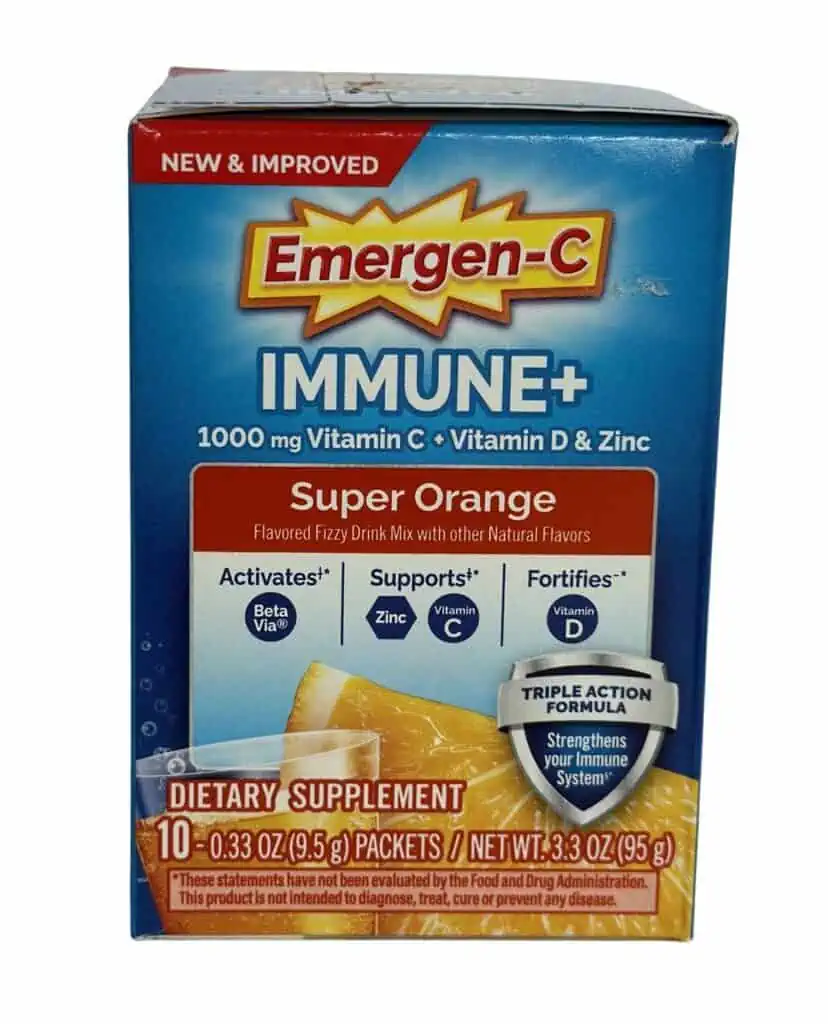
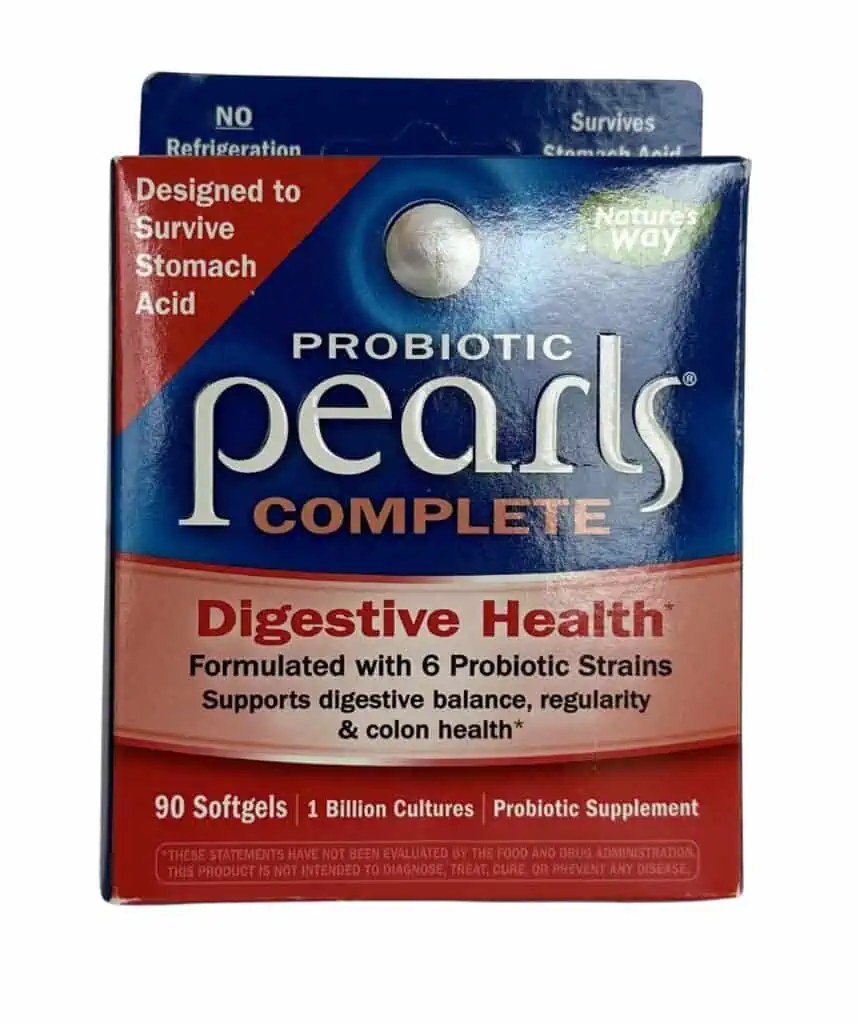
There are also some terrific probiotic supplements you can use to ensure you are getting enough. Look for supplements that contain Lactobacillus and Bifidobacterium. These strains of probiotics are especially effective in boosting immunity.
A few years ago, my husband and I started taking a fiber supplement, Emergen-C, and Pearls (probiotic) every day and, for the most part, haven’t been plagued by any minor upsets since. This is anecdotal but with leanings back to science. Before and during your trip, taking probiotics can help improve your immune system and is an easy tip to keep yourself healthy while on the road.
2. Stay Hydrated!
This seems like a no-brainer, but you would be surprised how many people go without a drink of water all day. The body can handle going a few hours without food, but staying hydrated is essential for feeling good while traveling.
Hydration is vital for many reasons. When you’re dehydrated, your body works harder than it should be to function – and that can lead to fatigue, headaches, and even migraines.
Being well-hydrated makes it easier for your body to fight off any illnesses while traveling and can help improve mood overall.
It’s easy to forget to drink water when you’re on the go, but make a point of sipping on water throughout the day (and not just during mealtimes) to ensure you’re getting enough fluids.
Your best bet? Get your own water bottle and refill it at any of the many “hydration stations” you will find on your travels. You can find many collapsible bottles to choose from, making packing and carrying it with you a breeze.

I started working with a life coach on my overall health about a year ago. One of the first things they brought up was hydration. Did you know it’s recommended that you drink ½ ounce of water for each pound you weigh? A person weighing 150 pounds needs 75 ounces of water every day!
3. What To Eat When You Are On The Road
You are in a new place with amazing foods, and you want to try them all. Yay, you! That’s what travel-eat-cook is all about!
Start each day with a good breakfast full of fresh fruits (remember to wash them with good water first) and local specialties. Most hotels in Europe and Asia provide a breakfast (usually buffet style) in the price of your stay. Take full advantage of this perk.



Do a food tour with a local guide and ask all the questions. Taste everything, but there are a few caveats:
Please note the following is NOT medical advice.
Do enjoy street food. Eating is a fun way to indulge in the local culture. You get the added advantage and entertainment of watching your food be made.
Don’t eat street food from a vendor who is not making the food fresh before your very eyes. Food that’s been sitting around for who knows how long may not be safe.
Do enjoy the local libations. You’re on holiday after all
Don’t go overboard with the alcohol. It’s horrible to lose a day of your vacation to a hangover.
If you have a sensitive tummy, it’s probably best to stay away from these foods:
- Unpasteurized dairy products, anything with mayonnaise, such as sandwiches and salads,
- Unpasteurized juice,
- Undercooked meat, especially pork
These are the foods most often cited as sources of traveler’s diarrhea
Avoiding the bad stuff is even more critical when visiting high-risk countries with a greater chance of ingesting contaminated food and water.
4. If You Haven’t Already Heard – Washing Your Hands Is Important
One of the easiest tips to stay healthy when traveling is to practice good personal hygiene.
Washing your hands regularly, especially before you eat, is one of the most effective ways to prevent the spread of illness. It’s something everyone can do easily and without much expense.

When you are out and about and soap and water aren’t available, use that bottle of anti-bacterial gel you brought along.
And while you’re at it, use one of your wipes to wipe down your utensils; you don’t know where they’ve been.
In addition to washing your hands, you also need to take care of your oral hygiene. Brush your teeth regularly and use mouthwash.
5. Get Good Sleep
It can be hard to get a good night’s sleep when you’re on the go, but it’s important to make an effort. Lack of sleep can lead to several health problems, including fatigue and an increased risk of illness.
When you’re tired, your body is working harder than it should be to function. Fatigue makes it difficult to concentrate and can increase your stress levels, both of which are not good for your health.
Getting enough sleep is also crucial for keeping your immune system healthy. When you’re well-rested, your body can better fight off any illnesses you may come in contact with while on the road.
6. Stress Reducers – Make Time For Moderate Exercise
Yes, traveling can be stressful. There are several ways to reduce stress while traveling. Still, one of the most essential tips to stay healthy when traveling is to make time for moderate exercise.
Exercise releases endorphins. Endorphins have mood-boosting effects and help you feel better when you’re stressed. Exercise also helps relieve tension and anxiety and can help you sleep better.
If you’re traveling for an extended time, it’s a good idea to schedule regular workouts. This may not be possible if you’re on a tight schedule or visit someplace where there aren’t many fitness options.
On our last trip to Switzerland, we did a walking tour of Lucerne. As you can see from the map below, an average day in any particular city, we quickly clock our 10,000 + steps.
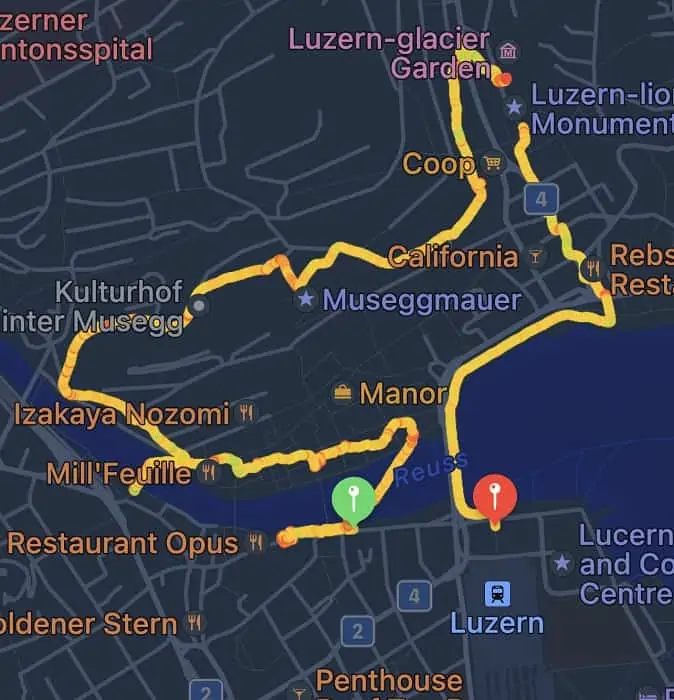
When we travel, we make a point of walking instead of taking cabs or Ubers as much as possible. Walking gives us two benefits: We get to see more of the cities we visit, and our exercise is built-in.
7. Minimize Jet Lag
When traveling long distances, there’s a good chance you’ll experience jet lag – especially if it’s your first time traveling to that particular time zone. Jet lag can make you feel tired, irritable, and out of sorts.
You can do a lot to minimize the effects of jet lag, including the following: Stay as hydrated as possible by drinking plenty of water. Avoid caffeine and alcohol, both of which can exacerbate the symptoms of jet lag.
Sleep on the plane if your trip is during the standard night time of your destination. Do you have trouble sleeping on the plane? Try some of my best tips.
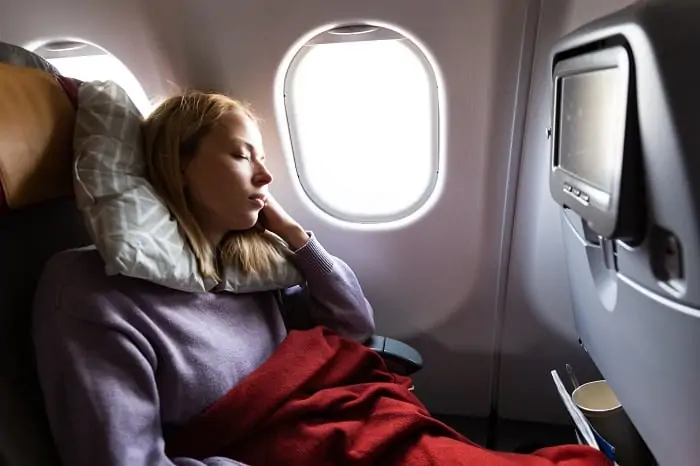
Get plenty of rest before your trip and try to stick to a regular sleep schedule once you’re on the road – Spend some time outdoors in natural light as soon as possible after arriving at your new destination – Avoid napping during the day to sleep better at night.
8. Slow Your Travel Down
When you’re in a new place, it’s tempting to want to see and do everything as quickly as possible. But if you’re always rushing around, you’re more likely to get sick or stressed out.
Slow down, take the time to relax, and enjoy your surroundings. Explore at your own pace, and don’t be afraid to say no to activities that sound too taxing or overwhelming.
Are you on a tight schedule? Try to build in some buffer time, so you’re not constantly feeling rushed. If possible, schedule a day or two where you can just relax and do nothing.

When you’re relaxed and taking things easy, you’ll be able to enjoy your travel experiences more fully.
9. Wear SPF Every Day – And Other Common Sense Measures
Traveling is a fun and exciting experience. You don’t want to waste precious time caring for a sunburn. One of the most important things you can do is wear sunscreen every day, no matter the weather conditions.
In tropical climates, especially near the equator (think Galapagos), wear clothing that protects you from the sun, such as long-sleeved shirts and pants and a wide-brimmed hat.
Also, insect repellant is a must if you travel in an area known for insects like mosquitoes. This is not just true for places like Panama; Alaska is known for its nasty mosquitos in the summer.

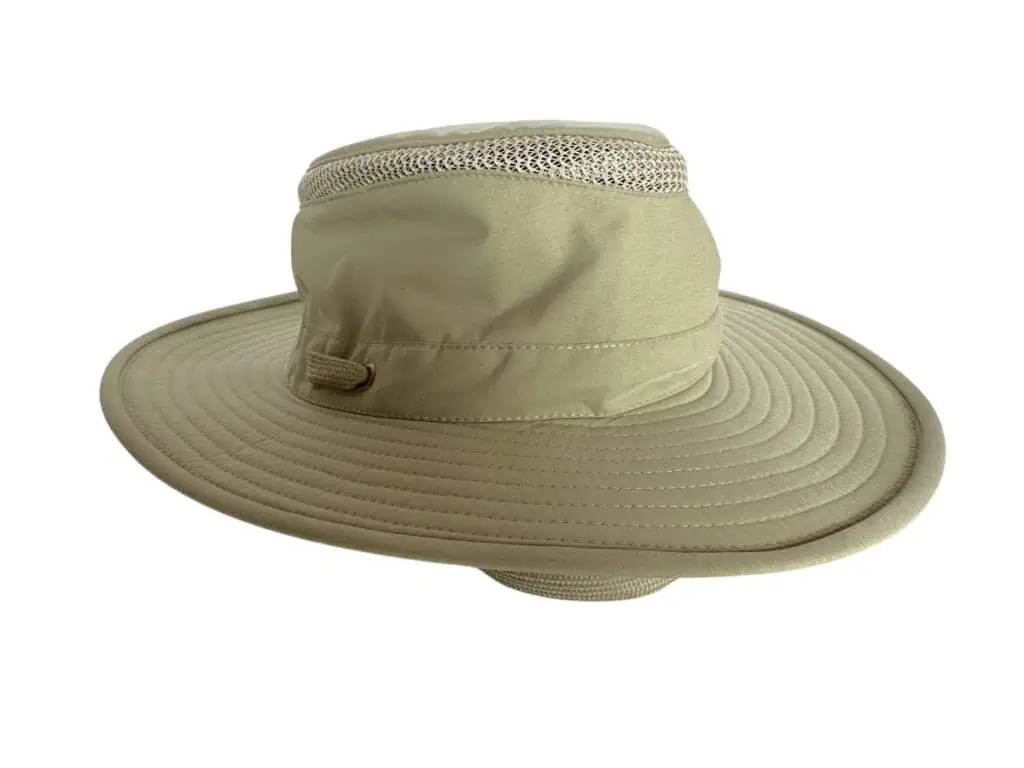

One lovely August, I got to spend a month in Telluride, Colorado. There are some very nasty deer flies there that love to visit me.
Are you visiting a country with a risk of contracting malaria or other mosquito-borne illnesses? Ensure the repellant you are using contains DEET, the most effective ingredient against mosquitoes.
10. Have A Small But Well Equipped First Aid Kit
A first aid kit is always on a list of tips to stay healthy when traveling; you don’t want to have to go out looking for a pharmacy in the middle of the night with an upset stomach.
The kit should include anti-bacterial wipes, adhesive bandages, antibiotic ointment, pain relief medication, antihistamines, Pepto, and insect repellent.
If you are visiting a developing country, it’s also a good idea to include items such as sterile gauze pads, medical adhesive tape, and tweezers.
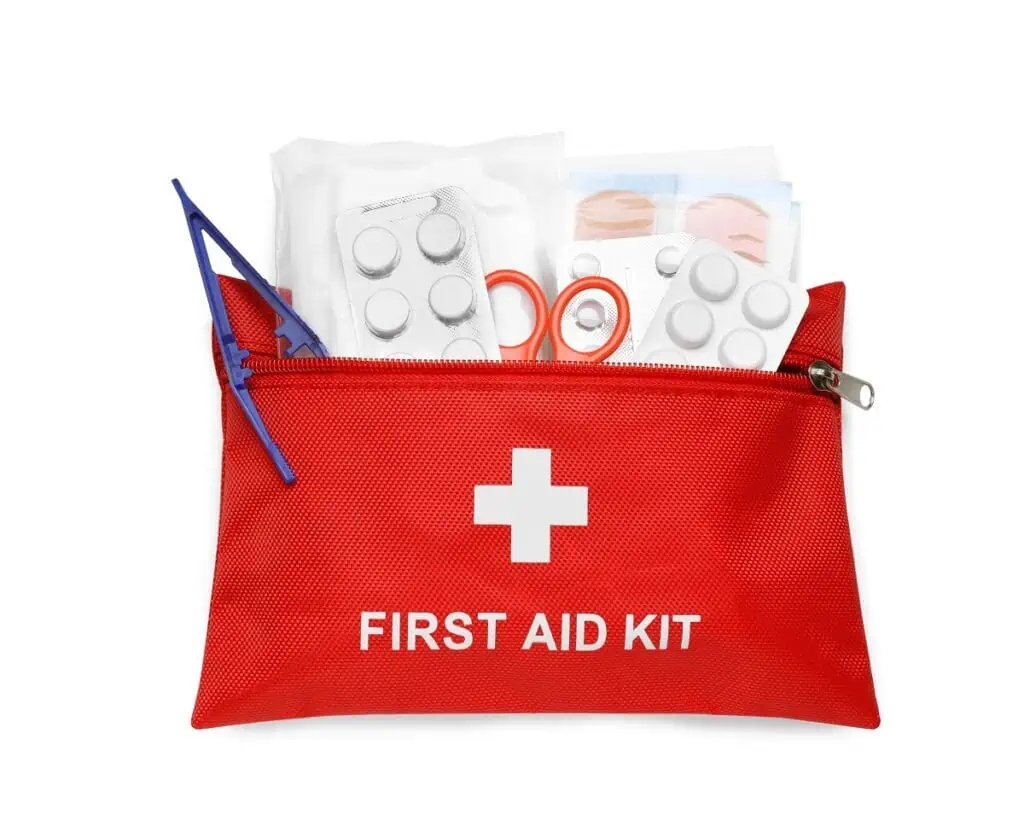
Have a small first aid kit with you for any minor injuries or illnesses that may occur while you’re on the road. It never hurts to be prepared, even if your trip requires nothing more than an occasional runny nose.
11. Plan To Stay Healthy When Traveling
Today more than ever, you should check with your country’s version of the US State Department Travel Advisories. Here you can find information about nearly everything that may affect your safe and healthy travels in any country.
Take some time to visit your GP or the local travel clinic before you head out on your fantastic adventure. Depending on where you visit, certain vaccinations may be required or recommended.
One of the best tips to stay healthy when traveling to a foreign country where you don’t speak the language is to carry a card or booklet explaining any medical conditions or treatments you are currently undergoing.
What To Do If You Get Sick
If you do get sick or injured while traveling, it’s crucial to have a plan for what to do.
Try to carry the contact information for local hospitals and clinics with you, as well as the name and contact information for your insurance company.
If you cannot walk or are in a lot of pain, it’s essential to find a hospital or clinic as soon as possible. Do not try to tough it out and wait until you feel better – getting treatment right away is essential for preventing any severe health problems.
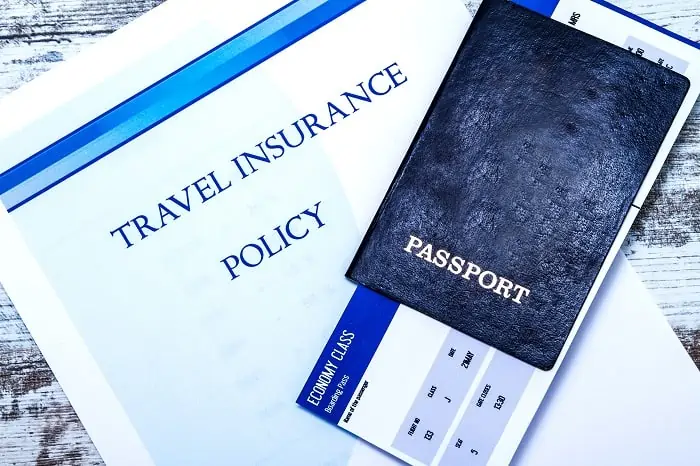
This Leads Us Right To Travel Insurance
Travel insurance is more important than ever for traveling. With the recent COVID-19 Pandemic, many travelers have been forced to quarantine. Worse yet, getting critically ill overseas is scary, and you just want to get home.
There are as many different types of travel insurance policies as there are travels. It’s essential to research and find one best suited for your needs. We’ve used AXA for the past few trips; they provide great value.
Some of the things that travel insurance may cover include trip cancellation or interruption, medical expenses, lost or stolen baggage, and rental car collision damage.
By having travel insurance, you’ll be able to rest assured that you’re covered in the event of any unexpected accidents or illnesses.
What Are Some Of Your Best Tips To Stay Healthy When You Travel?
So before you embark on your next big trip, make sure to stay healthy! You can’t have a good time when you are sick the whole way. These 11 easy tips to stay healthy when you travel will make for a more enjoyable journey.
Remember these for your future travels, so you don’t miss out on all of the fun!
We want to hear from you with your advice and tips for staying healthy while traveling! Which tip do you find most interesting? Share in the comments below.







